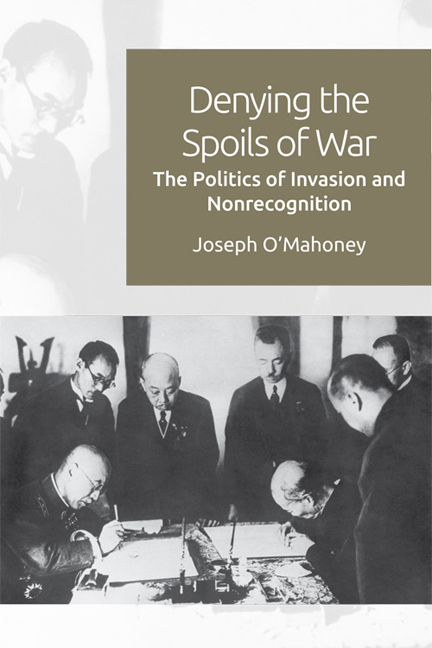Book contents
- Frontmatter
- Contents
- List of Figures and Tables
- Acknowledgements
- List of Acronyms and Abbreviations
- Introduction
- 1 Rule Maintenance: the Logic of Symbolic Sanctions
- 2 The Manchurian Crisis
- 3 The Abyssinian Crisis
- 4 Turkey, Cyprus and the Turkish Republic of Northern Cyprus
- 5 The Independence of Bangladesh
- 6 The Uncertain Fruits of Victory: Variation in Nonrecognition
- Conclusion
- Bibliography
- Index
Conclusion
- Frontmatter
- Contents
- List of Figures and Tables
- Acknowledgements
- List of Acronyms and Abbreviations
- Introduction
- 1 Rule Maintenance: the Logic of Symbolic Sanctions
- 2 The Manchurian Crisis
- 3 The Abyssinian Crisis
- 4 Turkey, Cyprus and the Turkish Republic of Northern Cyprus
- 5 The Independence of Bangladesh
- 6 The Uncertain Fruits of Victory: Variation in Nonrecognition
- Conclusion
- Bibliography
- Index
Summary
The conventional wisdom in international relations is that symbolic sanctions like nonrecognition of the results of force are either a waste of time because they do nothing to enforce compliance to the rule or that they are a cynical ploy by decision makers to appear to be doing something without paying the costs of doing anything stronger. By contrast, this book has argued that nonrecognition is a means of maintaining the rule of nonaggression. It does this by creating common knowledge, through collective public declaration, that states still consider the rule to be the rule. In other words, nonrecognition recreates the illegitimacy of aggression. How do we know this? Are decisions to engage in nonrecognition actually driven by rule maintenance considerations? In Chapters 2 and 4, I find that not only was rule maintenance one of the reasons given for the nonrecognition of Manchukuo and the TRNC, but that for many of the actors it seems to have been the main or the only justification for the policy. In both cases, public collective debate over the issue, in the League of Nations and the UN, was based on rule maintenance reasoning. Further, in Chapter 3, I find that the US, one of a small minority to persist in nonrecognition of the Italian conquest of Ethiopia, justified its policy in terms of rule maintenance.
The findings of the Manchurian Crisis case in Chapter 2 provide the clearest indication that nonrecognition is a symbolic sanction aimed at maintaining the rule against aggression. The reasoning behind the decision is often revealing and explicit. By the end of the process of deliberation over the League's adoption of the Lytton Report, the only surviving justification for not recognising Manchukuo was that such nonrecognition was an act of ‘the maintenance of the principles of peace and right’ (LNOJ 111 1933: 39). However, some of the features of the case provide a more complicated picture than that portrayed by the model presented in Chapter 1. One complication is that the definition of Japan's actions as aggression was vastly more fraught and fragmented than the phrase ‘interpreted as a violation’ seems to indicate. Initial perceptions of the actions of the Japanese military in the US and the League Council were mixed.
- Type
- Chapter
- Information
- Denying the Spoils of WarThe Politics of Invasion and Nonrecognition, pp. 202 - 208Publisher: Edinburgh University PressPrint publication year: 2018

